The Ultimate Guide to Choosing the Right Payment Gateway
- Published: 27 August 2024
- 12 min read
- Ecommerce, Grow Your Business


Heather Cameron
Author
From expert guidance and helpful accounting tips to insights on the latest trends in fintech, Heather is here to empower entrepreneurs and small business owners in Singapore with great content. With a background in digital marketing spanning eight years, she has experience writing for various industries and audiences. As Osome’s copywriter, she’s here to inform and inspire our readers with great storytelling.
A payment gateway is essential for businesses to accept online payments securely. It acts as an intermediary between customers’ banks and businesses, ensuring transactions are processed smoothly. In this guide, we’ll explore what payment gateways do, how they work, the types available, and how to choose the payment gateway that works best for your business.
Key Takeaways
- Payment gateways are secure intermediaries for online transactions, encrypting sensitive information and ensuring seamless communication between customers, businesses, and financial institutions.
- Understanding the key differences between payment gateways and payment processors is essential, as they perform distinct roles in the transaction process: gateways validate and transmit data. In contrast, processors handle transaction authorisation and settlement.
- When selecting a payment gateway, businesses should consider factors such as pricing structures, security features, integration capabilities, and support for international payments to enhance customer experience and streamline operations.
What Are Payment Gateways?
Payment gateways are the unsung heroes of online transactions. They act as intermediaries between customers, businesses, and financial institutions. They facilitate secure data transmission and ensure that sensitive information, such as credit card details, is encrypted and protected from unauthorised access.
Want to streamline your financial operations? Partner with Osome! Our professional team provides comprehensive ecommerce accounting services to help you stay organised and compliant. Let us handle your financial paperwork while you focus on growing your business.
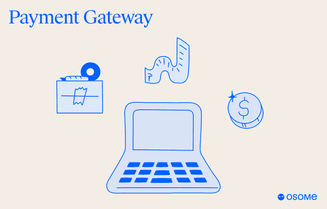
Payment gateways authorise and process online payments and payment processing, allowing businesses to accept several payment methods, including credit and debit cards, digital wallets, and bank transfers.
How payment gateways work
The journey of an online transaction begins when a customer makes a purchase. The payment gateway captures and encrypts the transaction information to protect sensitive payment details. This encrypted data is then transmitted to the payment processor for authorisation.
Next, the acquiring bank routes the transaction data to the customer’s issuing bank or payment processor to determine whether the transaction is approved or declined. The payment gateway plays a crucial role in this process by facilitating the authorisation and forwarding the transaction data to the acquiring bank.
Once the transaction is approved, the funds are transferred from the customer’s bank to the acquiring bank and deposited into the business’s bank account. This entire process, though complex, occurs within seconds, ensuring a smooth and efficient payment experience for both the customer and the business.
Types of payment gateways
There are various types of payment gateways, each designed to meet different business needs. Hosted gateways, such as PayPal, redirect users to their platform to complete the transaction, offering a straightforward and secure payment method. On the other hand, self-hosted gateways like Stripe enable customers to remain on the merchant’s website throughout the payment process, providing a more seamless experience.
API-hosted gateways and local bank integration types cater to businesses with specific requirements, offering flexibility and customisation. Understanding the different types of gateways helps businesses choose the payment method that best aligns with their operational needs and customer preferences.
Key features of payment gateways
Security is paramount when it comes to payment gateways. They employ advanced encryption technologies and fraud prevention tools to protect sensitive customer data, ensuring that transactions are secure and trustworthy. Compliance with standards such as the Payment Card Industry Data Security Standard (PCI DSS) is also essential for businesses that process credit card payments.
In addition to security, gateways support various payment methods, including credit and debit cards, digital wallets, and bank transfers, catering to diverse customer preferences. For instance, eWay is known for its all-in-one platform and easy-to-use solutions, making it a popular choice among businesses that offer multiple payment methods.
Payment Gateway vs. Payment Processor
Understanding the difference between a payment gateway and a payment processor is crucial for businesses looking to streamline their payment processes. While both play essential roles in online transactions, they have distinct functions.
A payment gateway validates and securely transmits transaction data between customers, businesses, and financial institutions. In contrast, a payment processor handles the actual payment processing, authorisation, and settlement of transactions.
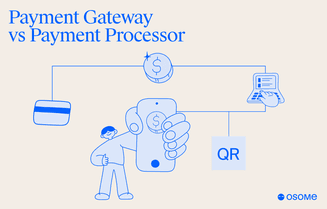
Role of a payment gateway
The role of a payment gateway is quite clear: it is responsible for handling transaction requests, managing data transmission, and overseeing authorisation. It ensures the customer’s payment details are verified and securely transmitted during online purchases. It is a crucial intermediary, connecting businesses with financial institutions to facilitate smooth transactions.
Moreover, a payment gateway verifies the customer’s payment information, ensuring the transaction can proceed without issues. This verification process is essential to prevent fraudulent transactions.
Role of a payment processor
On the other hand, the payment processors' function is to manage the actual processing of transactions, including authorisation and settlement. They link merchants to customers’ banks, ensuring that funds are transferred securely and efficiently to your business bank account. By handling these critical aspects, payment processors enable businesses to accept payments from various sources and ensure that transactions are completed successfully.
Additionally, payment processors often provide merchants with a dedicated account, known as a merchant account, which affects how funds are held and can influence transaction control. This direct contractual relationship with businesses allows payment processors to offer tailored solutions that meet specific business needs.
Benefits of Using a Payment Gateway
There are numerous benefits of utilising a payment gateway for businesses and customers alike. One of the primary advantages is enhanced security. These gateways employ robust encryption technologies and fraud detection systems to protect sensitive customer data, fostering trust among consumers and reducing the risk of fraud.
Moreover, payment gateways improve the customer experience by providing seamless, intuitive, and flexible payment solutions that work with their customers' preferred payment methods. This can increase customer loyalty and satisfaction, as customers appreciate the ease and convenience of paying online.
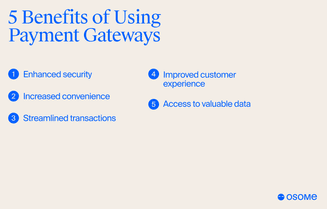
Additionally, the automated nature of payment gateways allows for quicker transaction processing, resulting in faster checkouts and improved business cash flow.
How To Choose the Best Payment Gateway for Your Business?
Choosing a payment gateway is a critical decision that can significantly impact your ecommerce site’s performance and customer satisfaction. Several factors should be considered, including pricing, any hidden fees, security, integration options, and support for international payments.
By evaluating these aspects, online businesses can select a payment gateway that aligns with their operational needs for accepting international payments and enhances the overall customer experience.
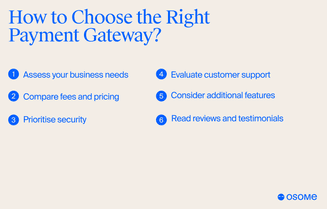
Pricing and transaction fees
Understanding the total cost of a payment gateway is essential for businesses. This includes setup fees, monthly fees, and transaction fees. Different gateways have various pricing models, such as percentage-based and fixed fees per transaction. For example, Stripe charges transaction fees starting at 3.4% for card payments. There is also an additional fixed fee of S$ 0.50 per online transaction.
Online businesses should consider their transaction volumes when choosing a pricing model, as high transaction volumes may make a fixed fee more cost-effective. Some gateways offer services like 3D Secure and fraud protection, which may mean higher transaction fees but provide added security and peace of mind.
Security and compliance
The security of a payment gateway is a top priority. Gateways utilise encryption protocols to protect sensitive data during transactions, ensuring that customer information is secure. Compliance with global data security standards like PCI DSS is crucial for safeguarding payment transactions and building consumer trust.
To further enhance security, businesses can implement proactive strategies, such as tokenisation and fraud management systems. These measures help detect and prevent fraudulent transactions, providing an additional layer of protection for both businesses and customers.
Integration and compatibility
Seamless integration with ecommerce platforms is essential for a smooth transaction experience. Payment gateways can be integrated directly through APIs or via plugins, making the process accessible for businesses with varying levels of technical expertise. For example, many platforms provide a range of plugins designed explicitly for popular payment gateways, simplifying the integration process.
Effective integration also requires compatibility with existing business infrastructure. Gateways that offer customisable solutions can better meet the unique needs of different businesses, ensuring that the integration process is smooth and efficient.
Support for international payments
For businesses looking to expand globally, support for international payment methods is crucial when choosing a payment gateway. Many payment gateways facilitate international transactions by supporting multiple currencies, allowing businesses to cater to a global customer base. For instance, Stripe supports transactions in over 25 currencies, making it an ideal choice for businesses targeting international markets and needing to accept global payments. We'll explore other payment gateways below.
Understanding the fees associated with accepting foreign currencies in transactions is also essential. These fees can vary between gateways and impact international payment processing costs. Choosing a payment gateway with competitive pricing for global payments helps businesses optimise their payment processes and expand their global reach.
Popular Payment Gateways in Singapore
Singapore’s ecommerce market is thriving, and selecting the best payment gateway for your business' needs is pivotal for success. Several gateways stand out in this market due to their robust security, helpful customer support, and seamless integration capabilities.
We will explore some of the most popular payment gateways in Singapore and provide insights into their unique features and benefits.
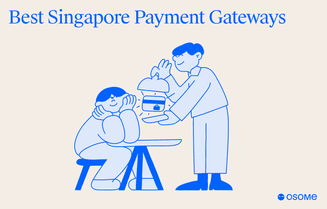
Stripe
Stripe, founded in 2010, has quickly become a favourite among businesses in Singapore looking to expand and scale. Known for its ease of use and comprehensive payment platform, Stripe supports various payment methods, including credit and debit cards. Transaction fees start at 3.4% plus S$ 0.50 for card payments. This allows Stripe to offer competitive pricing and robust security features, making it an excellent choice for businesses of all sizes.
Stripe’s API integration capabilities and support for multiple currencies further enhance its appeal. Businesses can easily integrate Stripe into their ecommerce platforms, ensuring a seamless local and international payment experience for customers.
PayPal
PayPal is a widely recognised and trusted payment gateway that streamlines the process of payment for businesses and customers. Its user-friendly interface and secure transaction handling make it a preferred payment method for many online shoppers. PayPal’s transaction fees for PayPal Checkout are set at 3.49% plus S$ 0.69, offering competitive pricing for businesses.
One of PayPal’s standout features is its strong security measures, including 24/7 monitoring to detect fraud. By providing a simple and secure payment solution, PayPal helps businesses attract and retain customers, enhancing the overall ecommerce experience.
DBS PayLah
DBS PayLah is a mobile payment app designed to make transactions more convenient for Singaporeans. It offers a range of services, including mobile payments, bill payments, and peer-to-peer transfers, making it a versatile payment solution for both consumers and businesses.
GrabPay
GrabPay has emerged as a popular mobile payment solution in Singapore, widely used by consumers and businesses. It offers various services, including mobile payments, bill payments, and peer-to-peer transfers, providing a comprehensive payment solution for everyday transactions.
With a transaction fee of 1% plus 7% GST, GrabPay is an affordable option for businesses looking to accept payments online. Its ease of use and integration capabilities make it a preferred choice for many merchants, enabling them to offer a convenient payment method to their customers.
Integrating a Payment Gateway into Your Ecommerce Platform
Integrating a payment gateway into your ecommerce platform is a critical step to ensure smooth and efficient online transactions. There are two main methods for integration: API integration and plugin integration. Each method has advantages and is suited to different levels of technical expertise.
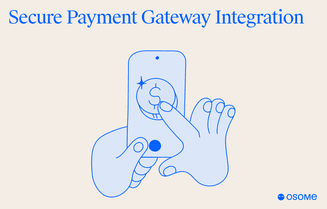
API integration
API integration involves incorporating necessary APIs or using existing plugins tailored for ecommerce platforms. This method requires technical knowledge but offers greater flexibility and customisation. Selecting appropriate APIs is essential for successful integration, as they facilitate communication between different payment systems.
Testing the integration in a sandbox environment is crucial to ensure functionality before going live. Implementing webhooks can enhance API payment gateway functionality by providing real-time transaction updates, ensuring a smooth transaction experience across different platforms.
Plugin integration
For businesses without extensive programming skills, plugin integration can simplify the process. Platforms like WooCommerce and Shopify offer a wide array of plugins that streamline the payment gateway integration process, requiring minimal coding and making it easier to get started.
Common Challenges and Solutions in Payment Gateway Integration
Integrating a payment gateway can present several challenges, from technical to security concerns. Proactively addressing these challenges can ensure a smooth integration process and a secure payment environment.
Technical difficulties
Technical challenges often arise during API integration, affecting transaction reliability. Regular testing of API integrations is vital to ensure accurate transaction processing and robust error handling. Regular comprehensive testing helps businesses identify and address errors or inconsistencies, providing effective integration performance.
Security concerns
Ensuring robust security during and after payment gateway integration is crucial for protecting sensitive customer data and reducing fraud. Implementing detailed transaction tracking and clear refund and return policies can help mitigate chargeback risks and improve accountability.
These strategies contribute to a secure payment environment and instil customer trust.
Managing the financial side of your ecommerce business can be complex. Osome offers comprehensive ecommerce accounting services to help you stay organised and compliant. Let us handle the numbers while you focus on growing your business. Contact us today!
Summary
Choosing the best payment gateway for your needs is essential for the success of your online business. From understanding the basics of payment gateways and their key features to exploring popular options in Singapore, this guide has covered all the critical aspects. By considering factors such as pricing, security, and integration capabilities, you can make an informed decision that aligns with your business needs. Remember, a well-chosen payment gateway enhances security and customer experience and streamlines your transaction processes, paving the way for business growth and success.






